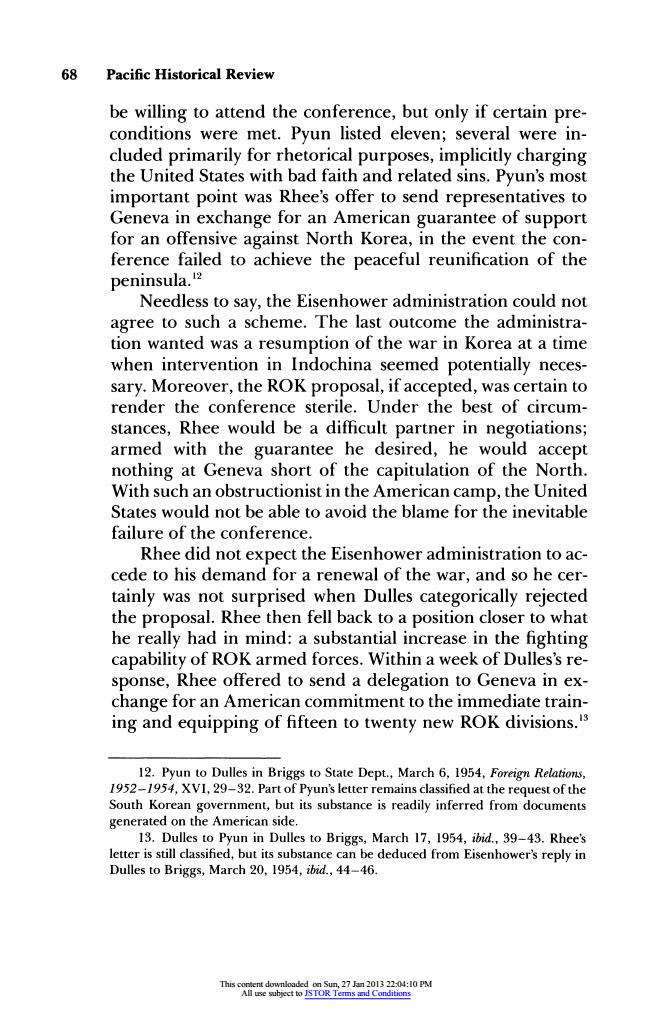正在加载图片...

68 Pacific Historical Review be willing to attend the conference,but only if certain pre- conditions were met.Pyun listed eleven;several were in- cluded primarily for rhetorical purposes,implicitly charging the United States with bad faith and related sins.Pyun's most important point was Rhee's offer to send representatives to Geneva in exchange for an American guarantee of support for an offensive against North Korea,in the event the con- ference failed to achieve the peaceful reunification of the peninsula.12 Needless to say,the Eisenhower administration could not agree to such a scheme.The last outcome the administra- tion wanted was a resumption of the war in Korea at a time when intervention in Indochina seemed potentially neces- sary.Moreover,the ROK proposal,if accepted,was certain to render the conference sterile.Under the best of circum- stances,Rhee would be a difficult partner in negotiations; armed with the guarantee he desired,he would accept nothing at Geneva short of the capitulation of the North. With such an obstructionist in the American camp,the United States would not be able to avoid the blame for the inevitable failure of the conference. Rhee did not expect the Eisenhower administration to ac- cede to his demand for a renewal of the war,and so he cer- tainly was not surprised when Dulles categorically rejected the proposal.Rhee then fell back to a position closer to what he really had in mind:a substantial increase in the fighting capability of ROK armed forces.Within a week of Dulles's re- sponse,Rhee offered to send a delegation to Geneva in ex- change for an American commitment to the immediate train- ing and equipping of fifteen to twenty new ROK divisions.'s 12.Pyun to Dulles in Briggs to State Dept.,March 6,1954,Foreign Relations, 1952-1954,XVI,29-32.Part of Pyun's letter remains classified at the request of the South Korean government,but its substance is readily inferred from documents generated on the American side. 13.Dulles to Pyun in Dulles to Briggs,March 17,1954,ibid.,39-43.Rhee's letter is still classified,but its substance can be deduced from Eisenhower's reply in Dulles to Briggs,March 20,1954,ibid.,44-46. This condent downloaded on Sun,27 Jan 2013 22:04:10 PM All use subpect to JSTOR Terms and Conditions68 Pacific Historical Review be willing to attend the conference, but only if certain preconditions were met. Pyun listed eleven; several were included primarily for rhetorical purposes, implicitly charging the United States with bad faith and related sins. Pyun's most important point was Rhee's offer to send representatives to Geneva in exchange for an American guarantee of support for an offensive against North Korea, in the event the conference failed to achieve the peaceful reunification of the peninsula.'2 Needless to say, the Eisenhower administration could not agree to such a scheme. The last outcome the administration wanted was a resumption of the war in Korea at a time when intervention in Indochina seemed potentially necessary. Moreover, the ROK proposal, if accepted, was certain to render the conference sterile. Under the best of circumstances, Rhee would be a difficult partner in negotiations; armed with the guarantee he desired, he would accept nothing at Geneva short of the capitulation of the North. With such an obstructionist in the American camp, the United States would not be able to avoid the blame for the inevitable failure of the conference. Rhee did not expect the Eisenhower administration to accede to his demand for a renewal of the war, and so he certainly was not surprised when Dulles categorically rejected the proposal. Rhee then fell back to a position closer to what he really had in mind: a substantial increase in the fighting capability of ROK armed forces. Within a week of Dulles's response, Rhee offered to send a delegation to Geneva in exchange for an American commitment to the immediate training and equipping of fifteen to twenty new ROK divisions." 12. Pyun to Dulles in Briggs to State Dept., March 6, 1954, Foreign Relations, 1952-1954, XVI, 29-32. Part of Pyun's letter remains classified at the request of the South Korean government, but its substance is readily inferred from documents generated on the American side. 13. Dulles to Pyun in Dulles to Briggs, March 17, 1954, ibid., 39-43. Rhee's letter is still classified, but its substance can be deduced from Eisenhower's reply in Dulles to Briggs, March 20, 1954, ibid., 44-46. This content downloaded on Sun, 27 Jan 2013 22:04:10 PM All use subject to JSTOR Terms and Conditions